Charles E W Bean, Diaries, AWM38 3DRL 606/261/1 - 1929 - 1930 - Part 5
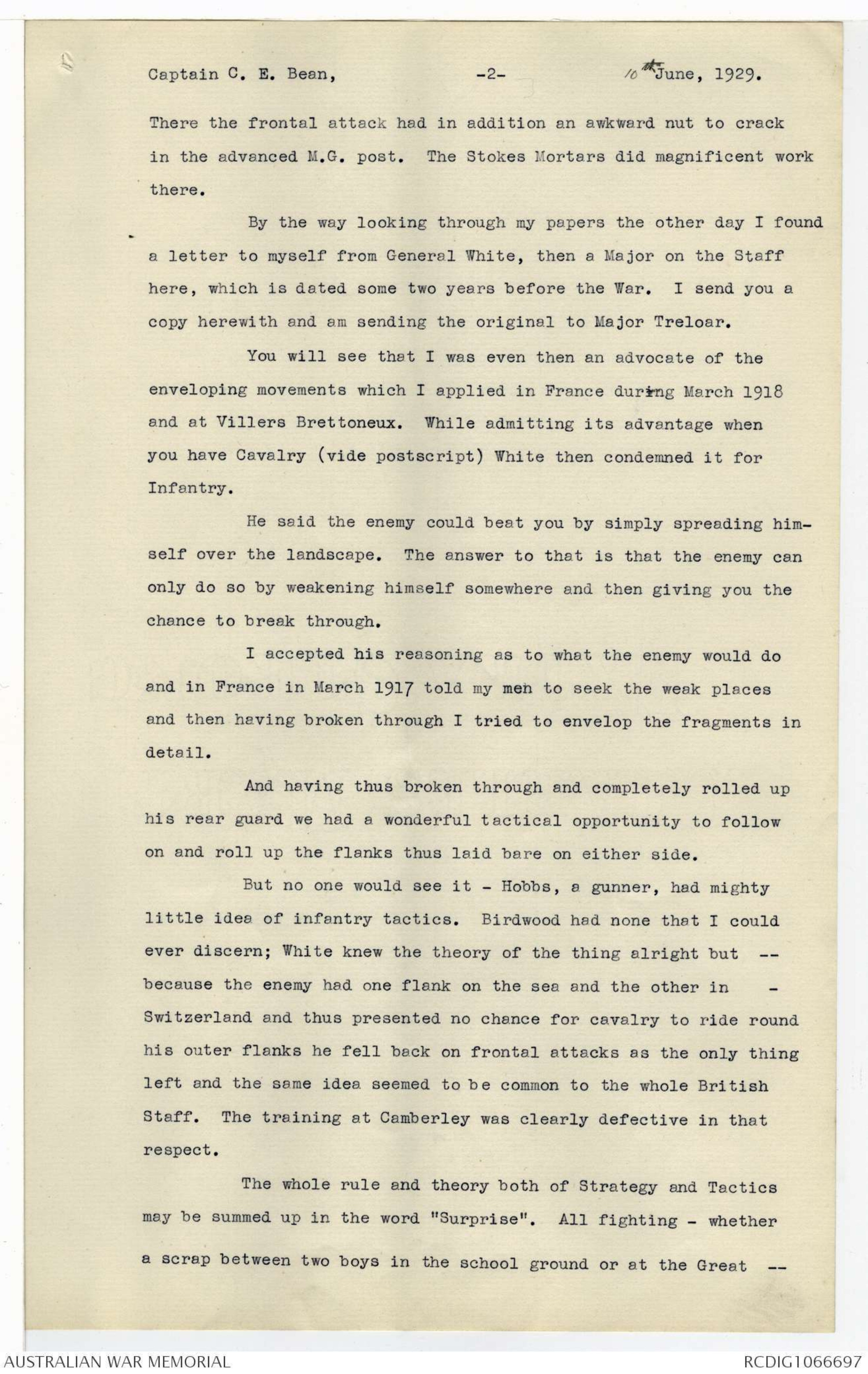
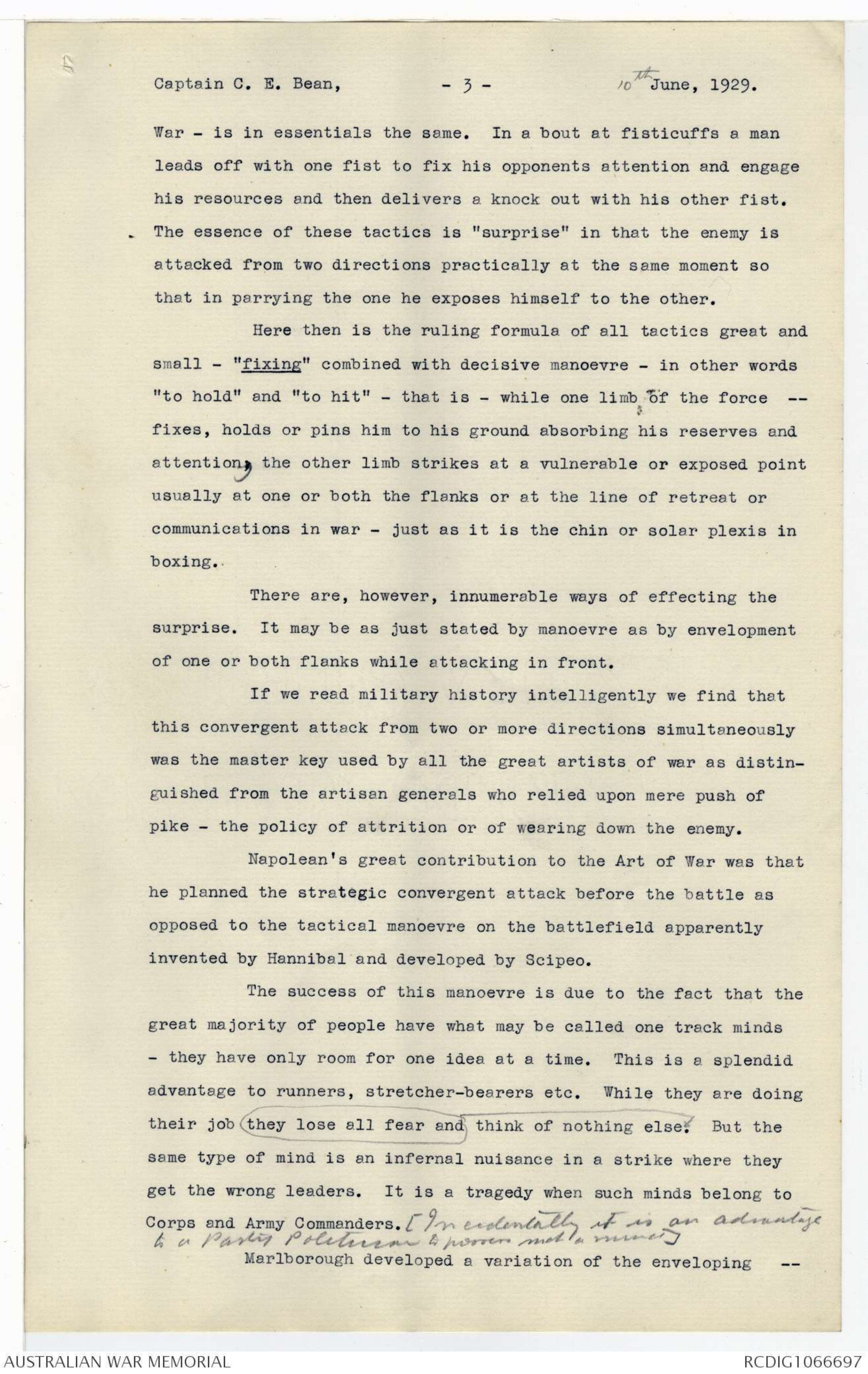
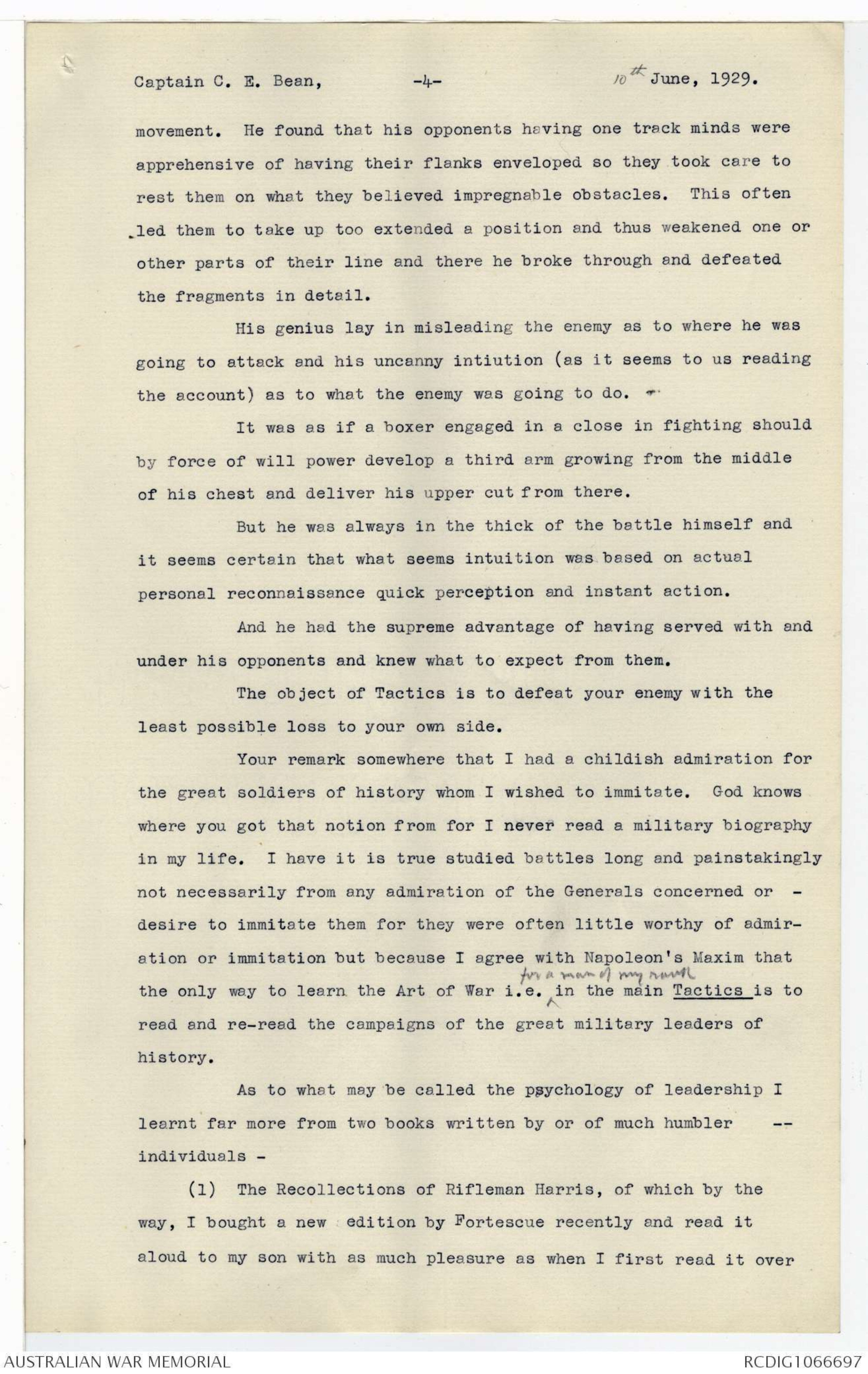
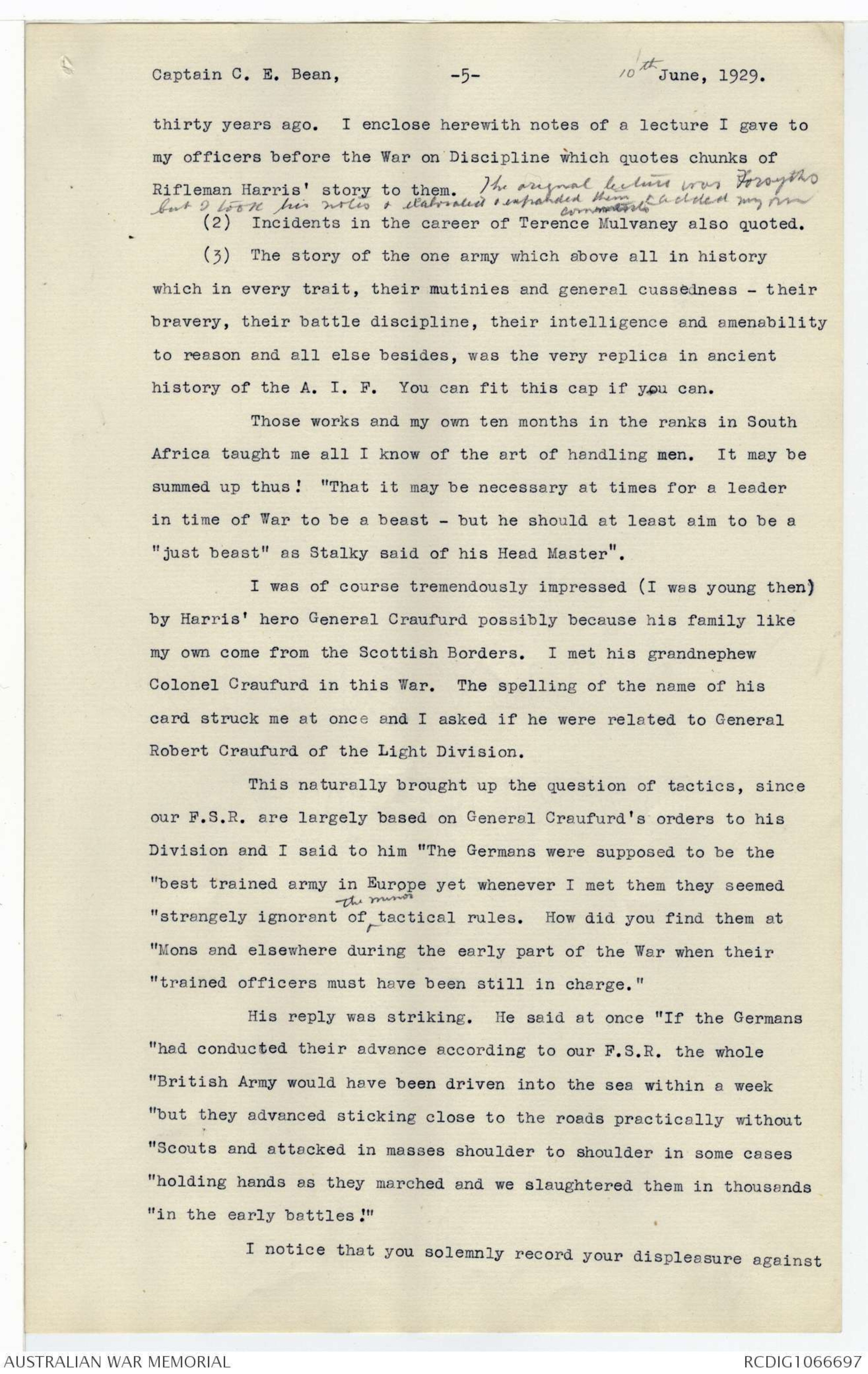
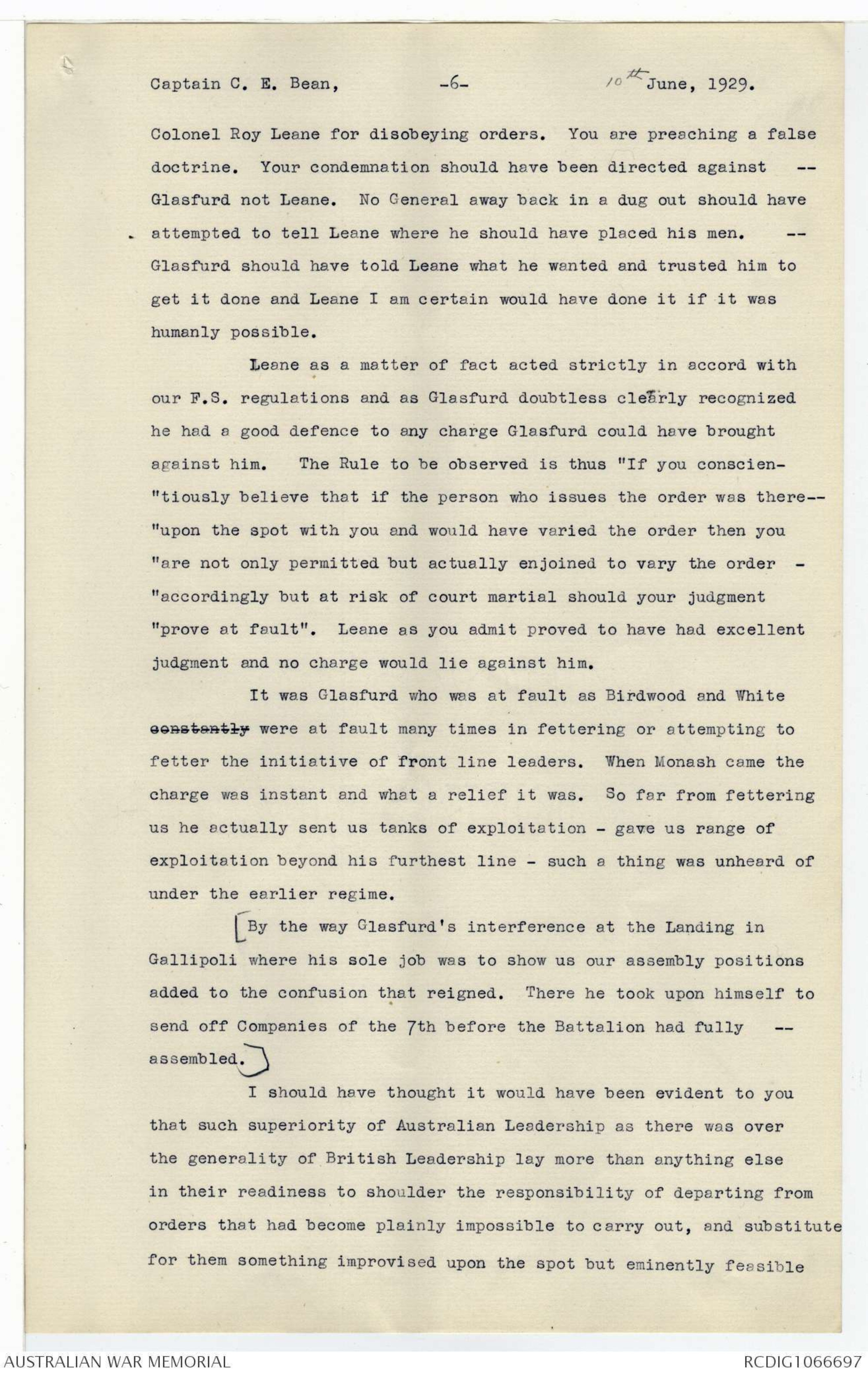
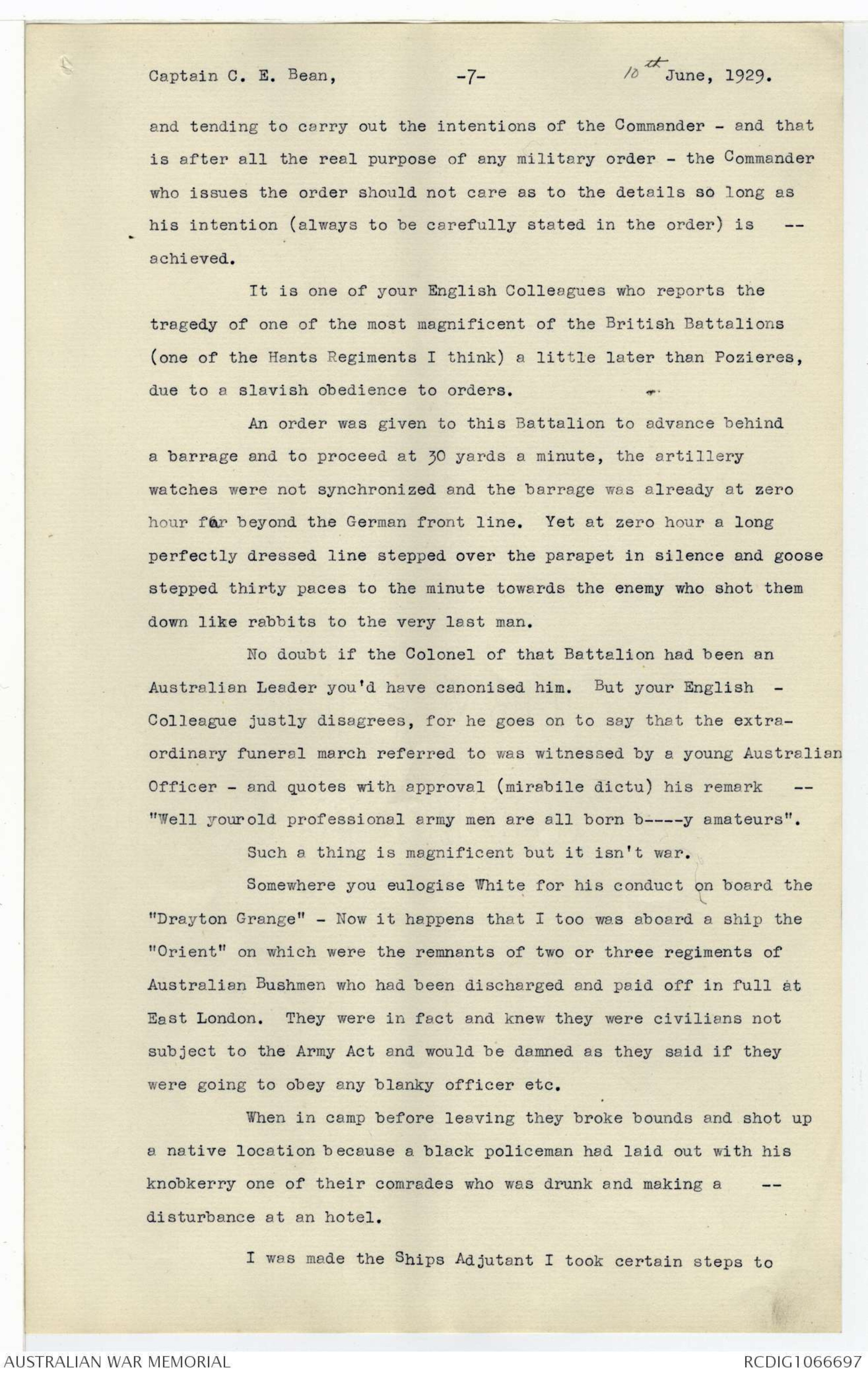
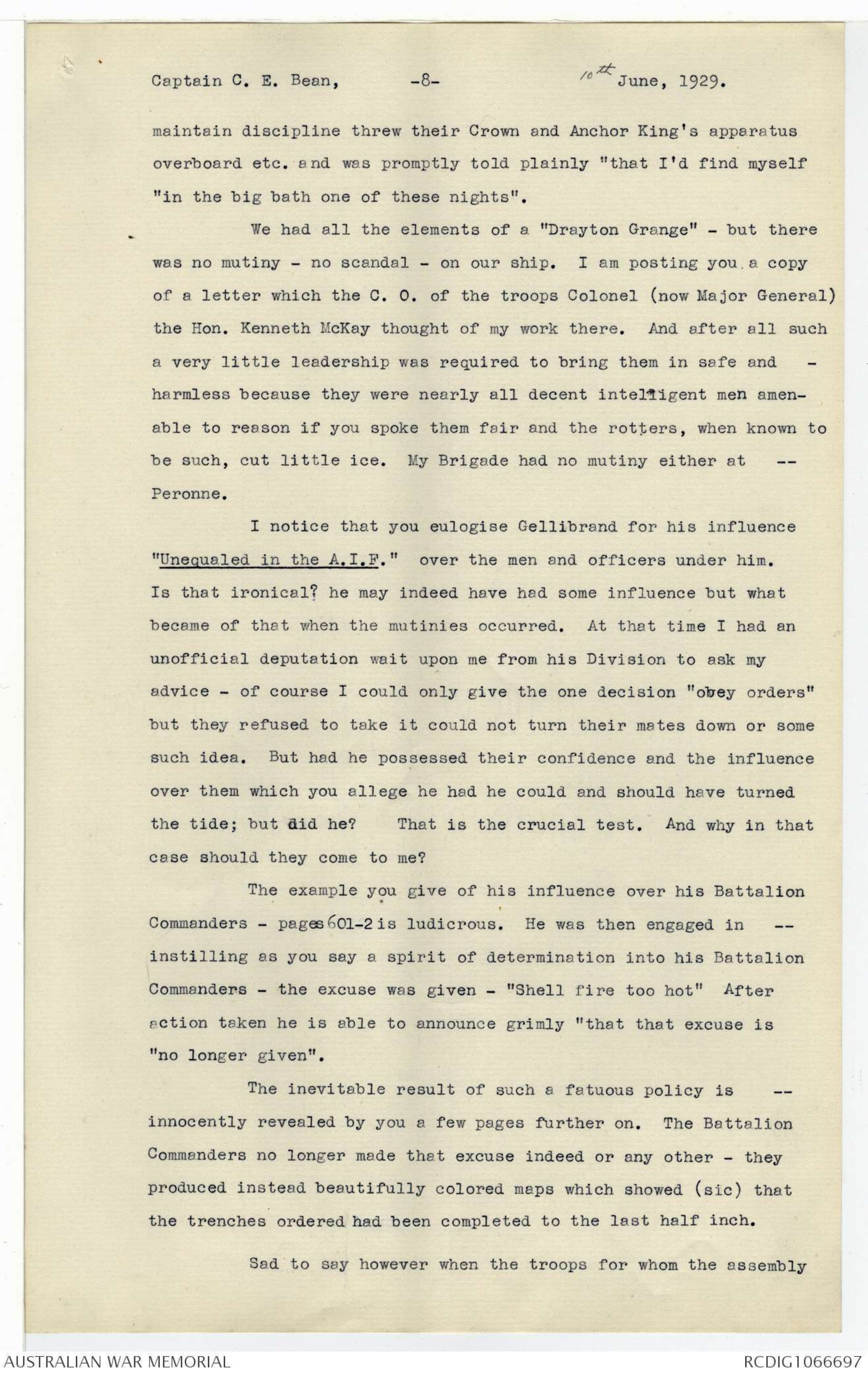
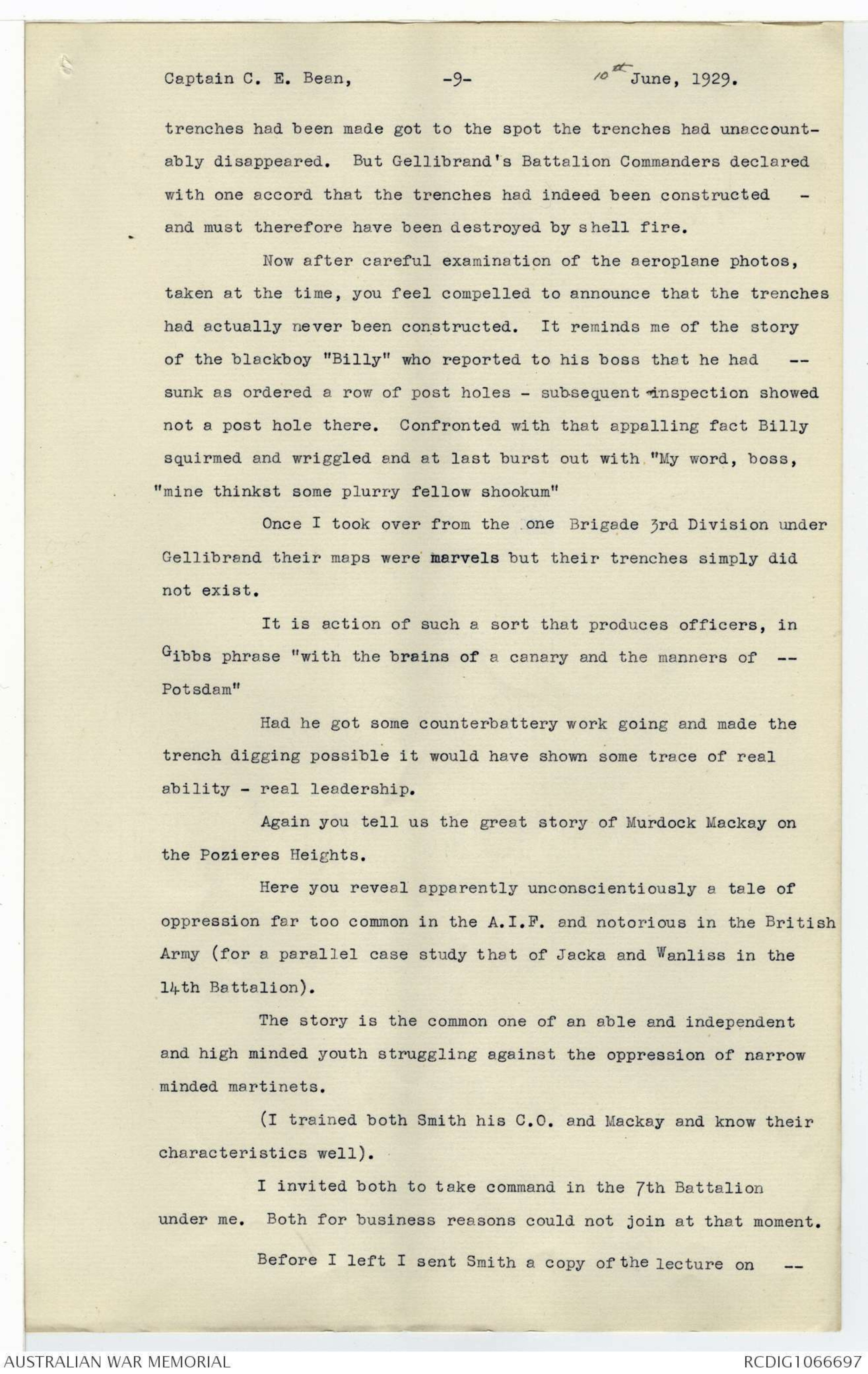
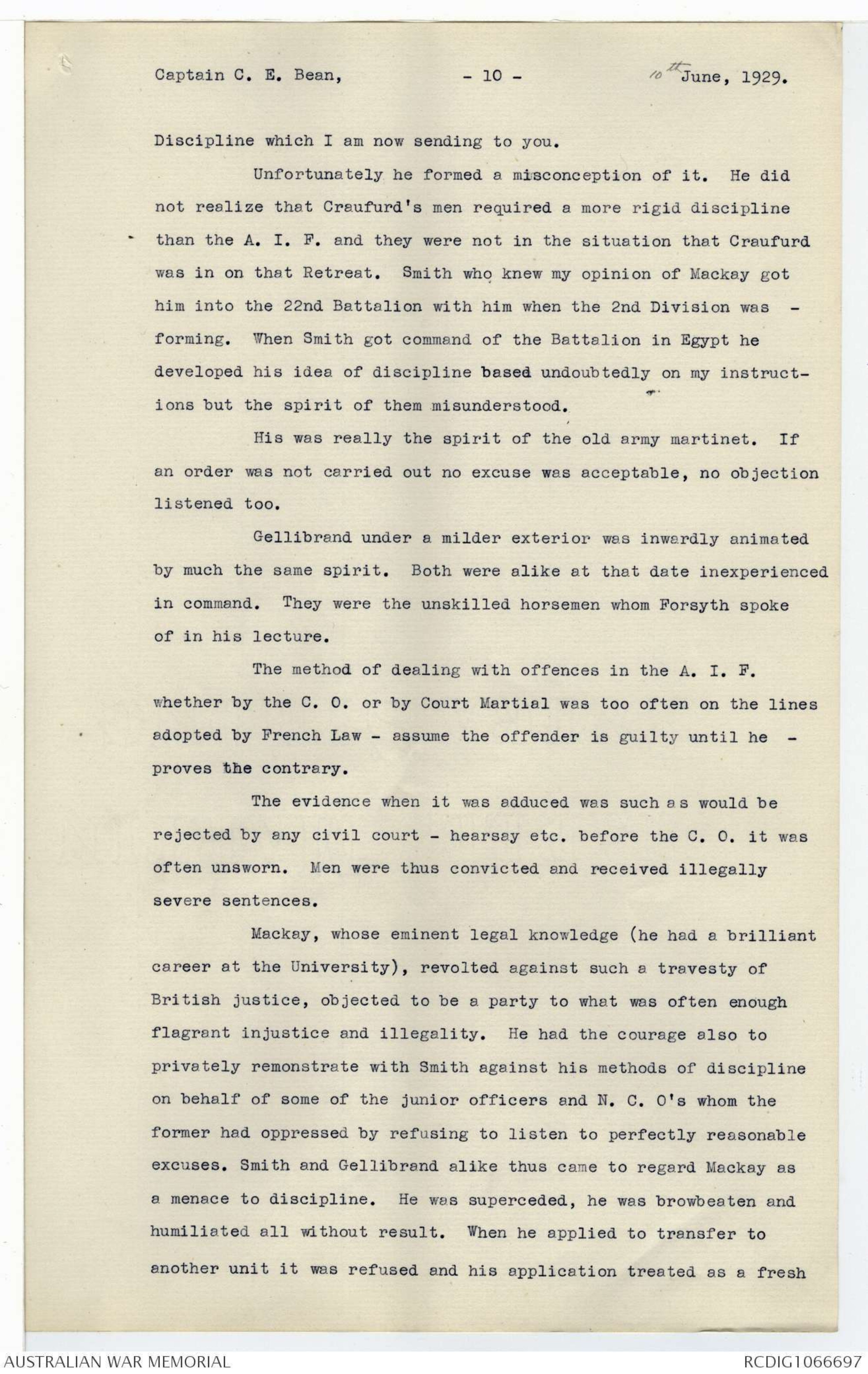
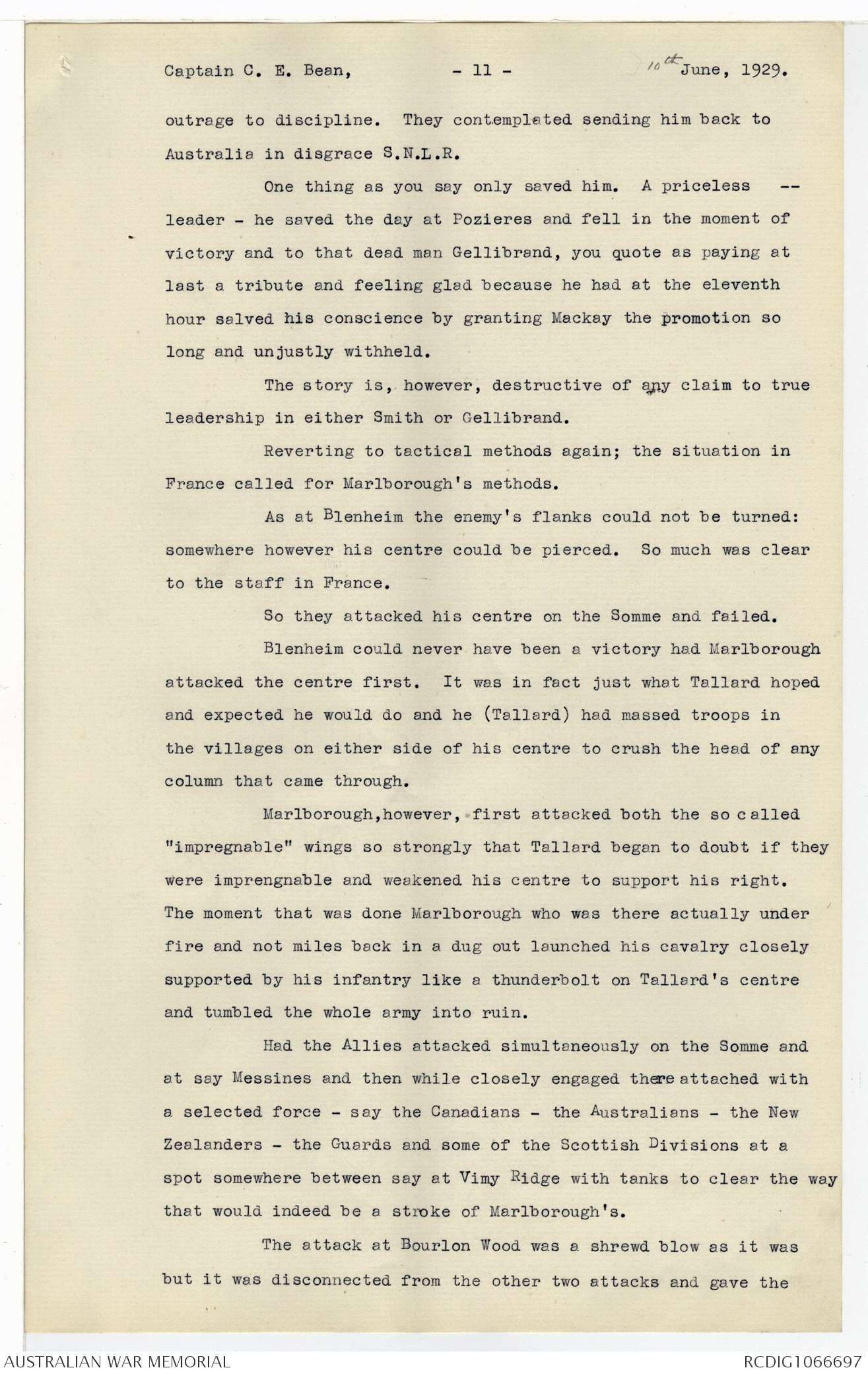
Captain C. E. Bean, -2- 10th June, 1929.
There the frontal attack had in addition an awkward nut to crack
in the advanced M.G. post. The Stokes Mortars did magnificent work
there.
By the way looking through my papers the other day I found
a letter to myself from General White, then a Major on the Staff
here, which is dated some two years before the War. I send you a
copy herewith and am sending the original to Major Treloar.
You will see that I was even then an advocate of the
enveloping movements which I applied in France during March 1918
and at Villers Brettoneux. While admitting its advantage when
you have Cavalry (vide postscript) White then condemned it for
Infantry.
He said the enemy could beat you by simply spreading himself
over the landscape. The answer to that is that the enemy can
only do so by weakening himself somewhere and then giving you the
chance to break through.
I accepted his reasoning as to what the enemy would do
and in France in March 1917 told my men to seek the weak places
and then having broken through I tried to envelop the fragments in
detail.
And having thus broken through and completely rolled up
his rear guard we had a wonderful tactical opportunity to follow
on and roll up the flanks thus laid bare on either side.
But no one would see it - Hobbs, a gunner, had mighty
little idea of infantry tactics. Birdwood had none that I could
ever discern; White knew the theory of the thing alright but
because the enemy had one flank on the sea and the other in
Switzerland and thus presented no chance for cavalry to ride round
his outer flanks he fell back on frontal attacks as the only thing
left and the same idea seemed to be common to the whole British
Staff. The training at Camberley was clearly defective in that
respect.
The whole rule and theory both of Strategy and Tactics
may be summed up in the word "Surprise". All fighting - whether
a scrap between two boys in the school ground or at the Great --
Captain C. E. Bean, - 3 - 10th June, 1929.
War - is in essentials the same. In a bout at fisticuffs a man
leads off with one fist to fix his opponents attention and engage
his resources and then delivers a knock out with his other fist.
The essence of these tactics is "surprise" in that the enemy is
attacked from two directions practically at the same moment so
that in parrying the one he exposes himself to the other.
Here then is the ruling formula of all tactics great and
small - "fixing" combined with decisive manoevre - in other words
"to hold" and "to hit" - that is - while one limb of the force --
fixes, holds or pins him to his ground absorbing his reserves and
attention, the other limb strikes at a vulnerable or exposed point
usually at one or both the flanks or at the line of retreat or
communications in war - just as it is the chin or solar plexis in
boxing.
There are, however, innumerable ways of effecting the
surprise. It may be as just stated by manoevre as by envelopment
of one or both flanks while attacking in front.
If we read military history intelligently we find that
this convergent attack from two or more directions simultaneously
was the master key used by all the great artists of war distinguished
from the artisan generals who relied upon mere push of
pike - the policy of attrition or of wearing down the enemy.
Napolean's great contribution to the Art of War was that
he planned the strategic convergent attack before the battle as
opposed to the tactical manoevre on the battlefield apparently
invented by Hannibal and developed by Scipeo.
The success of this manoevre is due to the fact that the
great majority of people have what may be called one track minds
- they have only room for one idea at a time. This is a splendid
advantage to runners, stretcher-bearers etc. While they are doing
their job they lose all fear and think of nothing else. But the
same type of mind is an infernal nuisance in a strike where they
get the wrong leaders. It is a tragedy when such minds belong to
Corps and Army Commanders. [Incidentally it is an advantage
to a Party Politician to power met a mind]
Marlborough developed a variation of the enveloping --
Captain C. E. Bean, -4- 10th June, 1929.
movement. He found that his opponents having one track minds were
apprehensive of having their flanks enveloped so they took care to
rest them on what they believed impregnable obstacles. This often
led them to take up too extended a position and thus weakened one or
other parts of their line and there he broke through and defeated
the fragments in detail.
His genius lay in misleading the enemy as to where he was
going to attack and his uncanny intiution (as it seems to us reading
the account) as to what the enemy was going to do.
It was as if a boxer engaged in a close in fighting should
by force of will power develop a third arm growing from the middle
of his chest and deliver his upper cut from there.
But he was always in the thick of the battle himself and
it seems certain that what seems intuition was based on actual
personal reconnaissance quick perception and instant action.
And he had the supreme advantage of having served with and
under his opponents and knew what to expect from them.
The object of Tactics is to defeat your enemy with the
least possible loss to your own side.
Your remark somewhere that I had a childish admiration for
the great soldiers of history whom I wished to immitate. God knows
where you got that notion from for I never read a military biography
in my life. I have it is true studied battles long and painstakingly
not necessarily from any admiration of the Generals concerned or
desire to immitate them for they were often little worthy of admiration
or immitation but because I agree with Napoleon's Maxim that
the only way to learn the Art of War i.e., ^for a man or my rank in the main Tactics is to
read and re-read the campaigns of the great military leaders of
history.
As to what may be called the psychology of leadership I
learnt far more from two books written by or of much humbler --
individuals -
(1) The Recollections of Rifleman Harris, of which by the
way, I bought a new edition by Fortescue recently and read it
aloud to my son with as much pleasure as when I first read it over
Captain C. E. Bean, -5- 10th June, 1929.
thirty years ago. I enclose herewith notes of a lecture I gave to
my officers before the War on Discipline which quotes chunks of
Rifleman Harris' story to them. The original lecture was Forstyths
but I took his notes & elaborated & expanded them & added my own
comments
(2) Incidents in the career of Terence Mulvaney also quoted.
(3) The story of the one army which above all in history
which in every trait, their mutinies and general cussedness - their
bravery, their battle discipline, their intelligence and amenability
to reason and all else besides, was the very replica in ancient
history of the A. I. F. You can fit this cap if you can.
Those works and my own ten months in the ranks in South
Africa taught me all I know of the art of handling men. It may be
summed up thus! "That it may be necessary at times for a leader
in time of War to be a beast - but he should at least aim to be a
"just beast" as Stalky said of his Head Master".
I was of course tremendously impressed (I was young then)
by Harris' hero General Craufurd possibly because his family like
my own come from the Scottish Borders. I met his grandnephew
Colonel Craufurd in this War. The spelling of the name of his
card struck me at once and I asked if he were related to General
Robert Craufurd of the Light Division.
This naturally brought up the question of tactics, since
our F.S.R. are largely based on General Craufurd's orders to his
Division and I said to him "The Germans were supposed to be the
"best trained army in Europe yet whenever I met them they seemed
"strangely ignorant of ^the minor tactical rules. How did you find them at
"Mons and elsewhere during the early part of the War when their
"trained officers must have been still in charge."
His reply was striking. He said at once "If the Germans
"had conducted their advance according to our F.S.R. the whole
"British Army would have been driven into the sea within a week
"but they advanced sticking close to the roads practically without
"Scouts and attacked in masses shoulder to shoulder in some cases
"holding hands as they marched and we slaughtered them in thousands
"in the early battles!"
I notice that you solemnly record your displeasure against
Captain C. E. Bean, -6- 10th June, 1929.
Colonel Roy Leane for disobeying orders. You are preaching a false
doctrine. Your condemnation should have been directed against --
Glasfurd not Leane. No General away back in a dug out should have
attempted to tell Leane where he should have placed his men. --
Glasfurd should have told Leane what he wanted and trusted him to
get it done and Leane I am certain would have done it if it was
humanly possible.
Leane as a matter of fact acted strictly in accord with
our F.S. regulations and as Glasfurd doubtless clearly recognized
he had a good defence to any charge Glasfurd could have brought
against him. The Rule to be observed is thus "If you conscientiously
"believe that if the person who issues the order was there --
"upon the spot with you and would have varied the order then you
"are not only permitted but actually enjoined to vary the order -
"accordingly but at risk of court martial should your judgment
"prove at fault". Leane as you admit proved to have had excellent
judgment and no charge would lie against him.
It was Glasfurd who was at fault as Birdwood and Whiteconstantly were at fault many times in fettering or attempting to
fetter the initiative of front line leaders. When Monash came the
charge was instant and what a relief it was. So far from fettering
us he actually sent us tanks of exploitation - gave us range of
exploitation beyond his furthest line - such a thing was unheard of
under the earlier regime.
[By the way Glasfurd's interference at the Landing in
Gallipoli where his sole job was to show us our assembly positions
added to the confusion that reigned. There he took upon himself to
send off Companies of the 7th before the Battalion had fully --
assembled.]
I should have thought it would have been evident to you
that such superiority of Australian Leadership as there was over
the generality of British Leadership lay more than anything else
in their readiness to shoulder the responsibility of departing from
orders that had become plainly impossible to carry out, and substitute
for them something improvised upon the spot but eminently feasible
Captain C. E. Bean, -7- 10th June, 1929.
and tending to carry out the intentions of the Commander - and that
is after all the real purpose of any military order - the Commander
who issues the order should not care as to the details so long as
his intention (always to be carefully stated in the order) is --
achieved.
It is one of your English Colleagues who reports the
tragedy of one of the most magnificent of the British Battalions
(one of the Hants Regiments I think) a little later than Pozieres,
due to a slavish obedience to orders.
An order was given to this Battalion to advance behind
a barrage and to proceed at 30 yards a minute, the artillery
watches were not synchronized and the barrage was already at zero
hour far beyond the German front line. Yet at zero hour a long
perfectly dressed line stepped over the parapet in silence and goose
stepped thirty paces to the minute towards the enemy who shot them
down like rabbits to the very last man.
No doubt if the Colonel of that Battalion had been an
Australian Leader you'd have canonised him. But your English -
Colleague justly disagrees, for he goes on to say that the extraordinary
funeral march referred to was witnessed by a young Australian
Officer - and quotes with approval (mirabile dictu) his remark --
"Well your old professional army men are all born b----y amateurs".
Such a thing is magnificent but it isn't war.
Somewhere you eulogise White for his conduct on board the
"Drayton Grange" - Now it happens that I too was aboard a ship the
"Orient" on which were the remnants of two or three regiments of
Australian Bushmen who had been discharged and paid off in full at
East London. They were in fact and knew they were civilians not
subject to the Army Act and would be damned as they said if they
were going to obey any blanky officer etc.
When in camp before leaving they broke bounds and shot up
a native location because a black policeman had laid out with his
knobkerry one of their comrades who was drunk and making a --
disturbance at an hotel.
I was made the Ships Adjutant I took certain steps to
Captain C. E. Bean, -8 - 10th June, 1929.
maintain discipline threw their Crown and Anchor King's apparatus
overboard etc. and was promptly told plainly "that I'd find myself
"in the big bath one of these nights".
We had all the elements of a "Drayton Grange" - but there
was no mutiny - no scandal - on our ship. I am posting you a copy
of a letter which the C. O. of the troops Colonel (now Major General)
the Hon. Kenneth McKay thought of my work there. And after all such
a very little leadership was required to bring them in safe and -
harmless because they were nearly all decent intelligent men amenable
to reason if you spoke them fair and the rotters, when known to
be such, cut little ice. My Brigade had no mutiny either at --
Peronne.
I notice that you eulogise Gellibrand for his influence
"Unequaled in the A.I.F." over the men and officers under him.
Is that ironical? he may indeed have had some influence but what
became of that when the mutinies occurred. At that time I had an
unofficial deputation wait upon me from his Division to ask my
advice - of course I could only give the one decision "obey orders"
but they refused to take it could not turn their mates down or some
such idea. But had he possessed their confidence and the influence
over them which you allege he had he could and should have turned
the tide; but did he? That is the crucial test. And why in that
case should they come to me?
The example you give of his influence over his Battalion
Commanders - pages 601-2 is ludicrous. He was then engaged in —
instilling as you say a spirit of determination into his Battalion
Commanders - the excuse was given - "Shell fire too hot" After
action taken he is able to announce grimly "that that excuse is
"no longer given".
The inevitable result of such a fatuous policy is --
innocently revealed by you a few pages further on. The Battalion
Commanders no longer made that excuse indeed or any other - they
produced instead beautifully colored maps which showed (sic) that
the trenches ordered had been completed to the last half inch.
Sad to say however when the troops for whom the assembly
Captain C. E. Bean, -9- 10th June, 1929.
trenches had been made got to the spot the trenches had unaccountably
disappeared. But Gellibrand's Battalion Commanders declared
with one accord that the trenches had indeed been constructed -
and must therefore have been destroyed by shell fire.
Now after careful examination of the aeroplane photos,
taken at the time, you feel compelled to announce that the trenches
had actually never been constructed. It reminds me of the story
of the blackboy "Billy" who reported to his boss that he had --
sunk as ordered a row of post holes - subsequent inspection showed
not a post hole there. Confronted with that appalling fact Billy
squirmed and wriggled and at last burst out with "My word, boss,
"mine thinkst some plurry fellow shookum"
Once I took over from the one Brigade 3rd Division under
Gellibrand their maps were marvels but their trenches simply did
not exist.
It is action of such a sort that produces officers, in
Gibbs phrase "with the brains of a canary and the manners of --
Potsdam"
Had he got some counterbattery work going and made the
trench digging possible it would have shown some trace of real
ability - real leadership.
Again you tell us the great story of Murdock Mackay on
the Pozieres Heights.
Here you reveal apparently unconscientiously a tale of
oppression far too common in the A.I.F. and notorious in the British
Army (for a parallel case study that of Jacka and Wanliss in the
14th Battalion).
The story is the common one of an able and independent
and high minded youth struggling against the oppression of narrow
minded martinets.
(I trained both Smith his C.O. and Mackay and know their
characteristics well).
I invited both to take command in the 7th Battalion
under me. Both for business reasons could not join at that moment.
Before I left I sent Smith a copy of the lecture on --
Captain C. E. Bean, - 10 - 10th June, 1929.
Discipline which I am now sending to you.
Unfortunately he formed a misconception of it. He did
not realize that Craufurd's men required a more rigid discipline
than the A. I. F. and they were not in the situation that Craufurd
was in on that Retreat. Smith who knew my opinion of Mackay got
him into the 22nd Battalion with him when the 2nd Division was -
forming. When Smith got command of the Battalion in Egypt he
developed his idea of discipline based undoubtedly on my instructions
but the spirit of them misunderstood.
His was really the spirit of the old army martinet. If
an order was not carried out no excuse was acceptable, no objection
listened too.
Gellibrand under a milder exterior was inwardly animated
by much the same spirit. Both were alike at that date inexperienced
in command. They were the unskilled horsemen whom Forsyth spoke
of in his lecture.
The method of dealing with offences in the A. I. F.
whether by the C. O. or by Court Martial was too often on the lines
adopted by French Law - assume the offender is guilty until he -
proves the contrary.
The evidence when it was adduced was such as would be
rejected by any civil court - hearsay etc. before the C. O. it was
often unsworn. Men were thus convicted and received illegally
severe sentences.
Mackay, whose eminent legal knowledge (he had a brilliant
career at the University), revolted against such a travesty of
British justice, objected to be a party to what was often enough
flagrant injustice and illegality. He had the courage also to
privately remonstrate with Smith against his methods of discipline
on behalf of some of the junior officers and N. C. O's whom the
former had oppressed by refusing to listen to perfectly reasonable
excuses. Smith and Gellibrand alike thus came to regard Mackay as
a menace to discipline. He was superceded, he was browbeaten and
humiliated all without result. When he applied to transfer to
another unit it was refused and his application treated as a fresh
Captain C. E. Bean, -11- 10th June, 1929.
outrage to discipline. They contemplated sending him back to
Australia in disgrace S.N.L.R.
One thing as you say only saved him. A priceless --
leader - he saved the day at Pozieres and fell in the moment of
victory and to that dead man Gellibrand, you quote as paying at
last a tribute and feeling glad because he had at the eleventh
hour salved his conscience by granting Mackay the promotion so
long and unjustly withheld.
The story is, however, destructive of any claim to true
leadership in either Smith or Gellibrand.
Reverting to tactical methods again; the situation in
France called for Marlborough's methods.
As at Blenheim the enemy's flanks could not be turned:
somewhere however his centre could be pierced. So much was clear
to the staff in France.
So they attacked his centre on the Somme and failed.
Blenheim could never have been a victory had Marlborough
attacked the centre first. It was in fact just what Tallard hoped
and expected he would do and he (Tallard) had massed troops in
the villages on either side of his centre to crush the head of any
column that came through.
Marlborough, however, first attacked both the so called
"impregnable" wings so strongly that Tallard began to doubt if they
were imprengnable and weakened his centre to support his right.
The moment that was done Marlborough who was there actually under
fire and not miles back in a dug out launched his cavalry closely
supported by his infantry like a thunderbolt on Tallard's centre
and tumbled the whole army into ruin.
Had the Allies attacked simultaneously on the Somme and
at say Messines and then while closely engaged there attached with
a selected force - say the Canadians - the Australians - the New
Zealanders - the Guards and some of the Scottish Divisions at a
spot somewhere between say at Vimy Ridge with tanks to clear the way
that would indeed be a stroke of Marlborough's.
The attack at Bourlon Wood was a shrewd blow as it was
but it was disconnected from the other two attacks and gave the
 Sandy Mudie
Sandy MudieThis transcription item is now locked to you for editing. To release the lock either Save your changes or Cancel.
This lock will be automatically released after 60 minutes of inactivity.